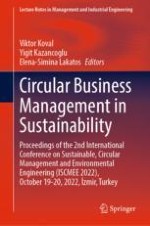This book gathers research and best-practices concerning the achievement of sustainable development goals in both community generation and business growth. It highlights the organizational aspects relating to the realization of green innovation. It covers models for optimizing the use of both natural and human resources. It reports on assessment methods and advanced models to analyze community and business performance in the context of sustainable development. Further, it proposes solutions to reduce the effects of environmental pollution, increase energy efficiency, and managing resources and waste, to foster sustainable development. Gathering the proceedings of the 2nd International Conference on Sustainable, Circular Management and Environmental Engineering (ISCMEE 2022), held on October 19-20, 2022, as a hybrid event from İzmir, Turkey, this book offers a timely snapshot on circular business management knowledge and methods for both researchers and professionals in the field of engineering management, business and economics, and energy and environment.
